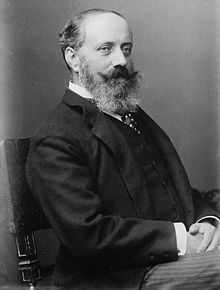Hugo Prince of Radolin
Hugo Julius Raoul Eduard Leszczyc Prince of Radolin (until 1888: Count von Radolin-Radolinski ) (born April 1, 1841 in Poznan ; † July 12, 1917 at Jarotschin Castle ) was a German Fideikommissherr , diplomat and high-ranking court official.
Family and property
He came from the old Polish noble family von Radolin . His father was the Prussian chamberlain and member of the manor house Emmerich Ladislaus Leszczyc Graf von Radolin-Radolinski (1808–1879), lord of Jarotschin and Radolin. His mother was Countess Josephine von Radolin-Radolinski (1809-1880).
He married in London in 1863 Lucy Katharina (1841-1880), a daughter of Lieutenant Colonel Alfred Howard Wakefield. After the death of his first wife, Radolin married Countess Johanna von Oppersdorff (1864–1947) in 1892 . She was the daughter of Count Hans von Oppersdorff and his wife Elisabeth, née de Talleyrand-Périgord .
Radolin was entrustment commissioner. His property included Jarotschin Castle and the lordship of the same name in the Pleschen district.
Life
Radolin studied law and political science in Bonn and Berlin . In 1860/61 he did his military service as a one-year volunteer with the 7th Hussar Regiment of the Prussian Army in Bonn. In 1862 he was appointed second lieutenant in the reserve in the 2nd Leib-Hussar Regiment . Between 1864 and 1866 he worked at the district court in Pleschen.
From 1866 he was a Prussian diplomat and held various posts. Between 1866 and 1868 he was an attaché in Florence . He was then a councilor in Paris and Stuttgart . For about two years he worked in the high command of the German occupation forces in France. From 1874 he was Legation Counselor in Madrid and in the same year in Dresden . From 1876 to 1881 he was the first embassy secretary in Constantinople . In 1881 he was a laborer in the political department of the Foreign Office . From 1882 Radolin was ambassador in Weimar . He was a hereditary member of the Prussian mansion since 1880.
Between 1884 and 1888 he was court marshal and later chief court marshal of Crown Prince and Emperor Friedrich III. Otto von Bismarck initially disapproved of Radolin because of his Polish family background, but eventually confirmed his loyalty to him. Franz von Roggenbach even suspected that Radolin was a spy of Bismarck at the court of the Crown Prince couple. It is correct that he was a confidante for both the chancellor and the prince couple. Radolin was a friend of Friedrich von Holstein . He was like this and the Crown Prince couple for a foreign policy that was friendly to England. He was skeptical of Bismarck's policy towards Russia. Radolin provided the Austrian government with confidential information. Against the instructions of Crown Princess Victoria , Radolin informed Prince Wilhelm about the incurable state of health of the father.
As emperor, Friedrich Radolin was raised to the hereditary prince status in 1888. In 1888 he was appointed the real secret council and chief steward and chief court steward of Wilhelm II.
In 1892 Radolin re-entered the diplomatic service. He owed his career in the following years to v. Holstein and Wilhelm II. Radolin represented the German Empire as ambassador in Constantinople from 1892 and in St. Petersburg from 1895 . Between 1901 and 1910 he was ambassador to Paris. His diplomatic achievements were rather limited. He had to be withdrawn from Russia because he had a dispute with the tsarina. In Paris he tried in vain for a Franco-German rapprochement.
Radolin was a knight of the Black Eagle Order . For his participation in the Franco-German Morocco Agreement of February 9, 1909, he received the Grand Cross of the Legion of Honor .
literature
- Herrmann AL Degener : Who is it? Contemporary Lexicon . Verlag von HA Ludwig Degener, 4th edition, Leipzig 1909, p. 1102.
- Gerd Fesser : Radolin, Hugo Fürst von. In: New German Biography (NDB). Volume 21, Duncker & Humblot, Berlin 2003, ISBN 3-428-11202-4 , p. 97 f. ( Digitized version ).
- Minutes of the Prussian State Ministry, Vol. 10, p. 425 Digital copy (PDF; 2.9 MB)
- Hermann Krüger (ed.): Chronicle of the Prussian manor house. A commemorative book to commemorate the manor's 30th anniversary. Berlin 1885, p. 194.
Individual evidence
- ^ Ernst Rutkowski: Letters and documents on the history of the Austro-Hungarian monarchy with special consideration of the Bohemian-Moravian area. Munich, 1991. p. 217 Partial digitization .
- ^ Genealogical handbook of the nobility. Volume Fü V, page 541, CA Starke-Verlag, 1959.
- ^ Wilhelm II .: Events and Figures 1878-1908. Verlag KF Koehler, Leipzig / Berlin, 1922, p. 107.
| personal data | |
|---|---|
| SURNAME | Radolin, Hugo Prince of |
| ALTERNATIVE NAMES | Radolin, Hugo Julius Raoul Eduard Leszczyc Prince of (full name) |
| BRIEF DESCRIPTION | German Fideikommissherr, diplomat and court official |
| DATE OF BIRTH | April 1, 1841 |
| PLACE OF BIRTH | Poses |
| DATE OF DEATH | July 12, 1917 |
| Place of death | Jarotschin |

